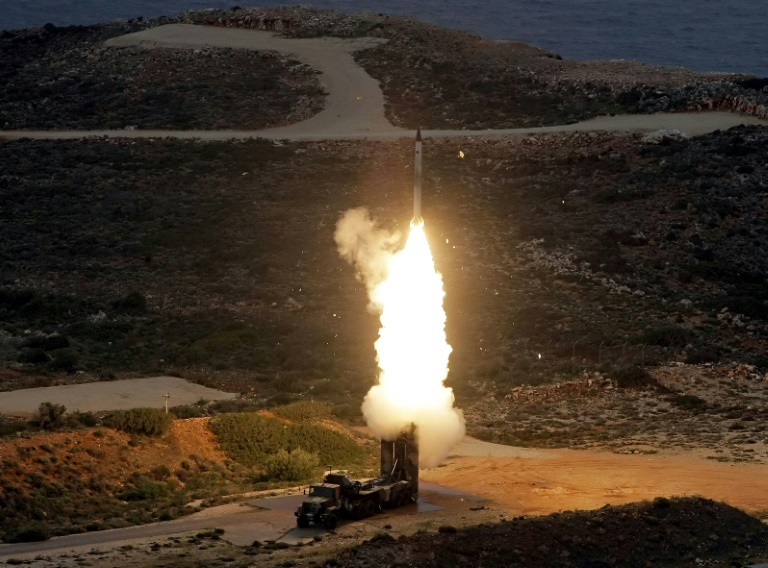
Greek troops on exercise fire an S-300 surface-to-air missile like those delivered to Syria after a September Israeli strike during which a Russian aircraft was accidentally downed.(Photo: AFP)
Damascus Friday accused Israel of striking Syria, in what a monitor said were the such first missiles to hit the country since an air defence upgrade after the downing of a Russian plane in September.
The Syrian regime claimed its air defence systems shot down all "hostile targets" late Thursday. Israel did not confirm carrying out raids but denied any losses.
The Syrian foreign ministry on Friday said it had complained to the United Nations about "the Israeli aggression yesterday on the area of Kisweh south of Damascus".
According to the Syria Observatory for Human Rights, the strikes hit two positions in the south of Damascus province, one an area where there are Iranian weapons depots in Kisweh.
"Israeli forces bombarded for an hour," Observatory chief Rami Abdel Rahman said.
Two missiles hit "weapons depots belonging to the Lebanese Hezbollah (militant group) as well as Iranian forces" in Kisweh.
Another missile hit the area of Harfa, where there is a Syrian military base, the Britain-based monitor said.
In Kisweh, "the depots that were targeted are used to temporarily store rockets until they are taken somewhere else," Abdel Rahman said.
"It appears the Israelis had intelligence that weapons had arrived there recently," he said.
The state news agency said the attack was foiled and did not admit to any losses.
"Our air defences fired on hostile targets over the Kisweh area and downed them," SANA said, citing a military source.
The pro-government Al-Watan daily, quoting a military source, said "the aggression, despite its intensity, was not able to implement any of its goals and all enemy bodies were downed".
Initial reports by the Observatory suggested there were no casualties.
The Israeli military denied any of its assets were hit but stopped short of denying it had conducted strikes at all.
Air defence upgrade
"Reports regarding an IDF (Israel Defence Forces) aircraft or an airborne IDF target having been hit are false," it said in an English-language statement.
It said a Syrian surface-to-air missile was fired in the direction of an open area of the Israeli-occupied Golan Heights but it was unclear if it had hit Israeli-held territory.
Israel has carried out hundreds of air strikes in neighbouring Syria against what it says are Iranian targets, many of them in the area south of Damascus.
Iran and Russia are the government's key allies in the civil war that has raged Syria since 2011, and Moscow's intervention in 2015 dramatically turned the tables against the rebels.
The accidental downing of a Russian transport aircraft by Syrian ground batteries during an Israel air strike on September 17 killed 15 service personnel.
coordination with Moscow over Syria
Moscow pinned responsibility for the downing on Israel, saying its fighter jet used the larger Russian one for cover, an allegation Israel disputed.
Russia subsequently upgraded Syrian air defences with the delivery of the advanced S-300 system, which Damascus had said last month would make Israel "think carefully" before carrying out further air raids.
The move raised fears in Israel that its ability to rein in its arch foe Iran's military presence in its northeastern neighbour would be sharply reduced.
There was no evidence however that the S-300 batteries were used to intercept Israeli missiles overnight.
Israeli Prime Minister Benjamin Netanyahu had told Moscow his government would continue to hit hostile targets in Syria to prevent Iran from establishing a military presence across the border.
He added that Israel would "continue security coordination" with Russia.


